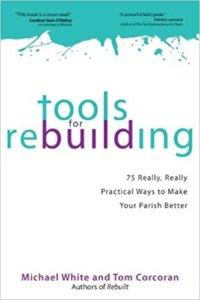Michael White and Tom Corcoran say excellence in ministry is essential to capturing the time and attention of your congregation and community. More importantly, it honors God, inspires people, builds trust, and rebuilds the church.
Everybody has had the experience of going to a play, a movie, or a concert and being blown away by the production. We’ve all dined at a great restaurant where an incredible meal was presented with impeccable service. You can’t stop talking about it to your friends. You find yourselves in sales for it. Think of an experience you’ve had like that. Now, think about how many times you’ve had that experience in a church setting.
We can’t take the interest and attention of either our congregation or our community for granted. The only way we know not to do that comes in valuing excellence and working toward it as our goal.
Excellence honors God.
Throughout scripture, we are encouraged to give God our best. In the book of Psalms, King David exhorts the musicians to employ their highest skill when approaching sacred music. The prophet Malachi demands that the priests and people alike bring their finest offerings to worship. Jesus praises the woman who anoints him with rare and expensive oil. Excellence insists that we always bring our best because when we do that it honors God.
Excellence inspires people.
It’s not about entertainment; it’s about impact and inspiration. Excellence will inspire the people in your pews to want to get involved and do more. Excellence attracts people, too. When you create a culture of excellence, people will be drawn to the parish. If, week after week, members of the church have an excellent experience, they will begin to share their experience with others. You won’t have to be people who invite friends, family members, and coworkers to church. You will create an enthusiasm that will create a buzz about your church and lead to invitations.
Excellence builds trust.
Over the years, we have built up trust with the members of our church because they know we do the things we do well. One year, when we announced that we were moving off campus to a new, bigger venue for our Easter Sunday services, we didn’t have to sell people on it. This could have been a major controversy in some churches but not here. Our parishioners went along with us. If truth be told, we were concerned about whether we could even pull it off. The response from the congregation was unambiguous: “We know it will be great. It always is.” They had more confidence in us that we did. And because they had confidence in us, they had trust in us, and they easily went where we were going.
Here are three practical steps to take:
1. Focus
To value excellence will require you to maintain focus. Jesus could do all things well; you can’t, but you definitely can do some things well, maybe even better than anybody else around you. So do those things. When you spread yourself too thin over too many tasks, then the quality of your work will decline. The same is true of your parish. Spread yourself too thin over too many programs, give your staff and volunteers too many disparate demands, and you will see the quality of your work diminish. Evaluate what you do well now. Start there.
2. Dedicate time.
Excellence requires time and dedication. You simply have to put time into programs and projects to really do them well. You also need time to develop skills necessary to excel. Excellence in preaching takes practices, excellent music takes practice, and excellent teaching, excellent greeting, and excellent pastoral care all take practice.
3. Celebrate what’s working.
Honor and reward those who are helping you make your programs the best they can be. Promote what you do well as part of who you are as a parish community. Make it part of your brand.
The Bible exhorts us to excellence. That’s because excellence honors God, inspires people, builds trust, and rebuilds the church. Think about those things — a lot.
 Excerpted from Tools for Rebuilding: 75 Really, Really Practical Ways to Make Your Parish Better (Ave Maria Press: 2013) by Michael White and Tom Corcoran. The book is available through the publisher and at Amazon. Used by permission.
Excerpted from Tools for Rebuilding: 75 Really, Really Practical Ways to Make Your Parish Better (Ave Maria Press: 2013) by Michael White and Tom Corcoran. The book is available through the publisher and at Amazon. Used by permission.
Related Resources
- Giving our Best to God? by Lovett H. Weems Jr.
- What Church Leaders Can Learn from Other Enterprises by Tony Hunt
- What Is Your Signature Ministry? by Phil Schroeder and Kay Kotan






